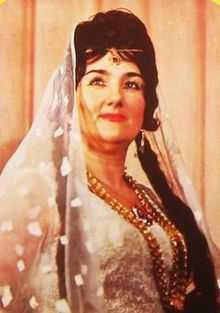Emina Zečaj
| Emina Zečaj | |
|---|---|
 | |
| Born |
Emina Ahmedhodžić 17 March 1939 Sarajevo, Drina Banovina, Kingdom of Yugoslavia |
| Occupation |
|
| Years active | c.1962–present |
| Religion | Sunni Islam |
| Children | 2 |
|
Musical career | |
| Genres | |
| Instruments |
|
| Labels | |
| Associated acts | |
Emina Zečaj (née Ahmedhodžić; born 17 March 1939) is a Bosnian interpreter of the traditional Bosniak folk music, sevdalinka.[1] Professor Cvjetko Rihtman, an ethnomusicologist, discovered her in the early 1960s. Following persuasion from her friends, Emina auditioned before two well known professors, Zvonimir Nevžela and Beluš Jungić, and was accepted into Radio Sarajevo, beating out 30 other contestants.[2]
Zečaj was called an "icon of traditional Bosnian music" by the American Billboard magazine in 2004.[3]
Early life
Emina was born into an ethnic Bosniak and Muslim family near Sarajevo's Old Town. She was the daughter of Avdija Ahmedhodžić and his wife Melća.[4]
Discography
 This list of songs or music-related items is incomplete; you can help by expanding it.
This list of songs or music-related items is incomplete; you can help by expanding it.
- Pijana sam i bez pića (1974)[5]
- Narodne pjesme iz Bosne (1975)[6]
- Traditional Bosnian Songs (2003)
- Zečaj Emina (2005)
- Emina Zečaj (2008)
External links
References
- ↑ "Who is who among Bosniacs; page 529". Google Books. 2001. Retrieved 18 November 2014.
- ↑ "Čitav život se borim za sevdah". Nezavisne. 8 September 2008. Retrieved 18 November 2014.
- ↑ "Billboard magazine; page 53". Google Books. 14 February 2004. Retrieved 18 November 2014.
- ↑ "Emina Zečaj, interpretatorka sevdalinke - Ikona bh. sevdaha". Ekapija. 5 September 2012. Retrieved 18 November 2014.
- ↑ "Pijana sam i bez pića". Discogs. 1974. Retrieved 18 November 2014.
- ↑ "Narodne pjesme iz Bosne". Discogs. January 1975. Retrieved 18 November 2014.